#she wants the audience and utena to believe this
Explore tagged Tumblr posts
Text
utena being a story about stories is great. anthy stabbing utena being treated as a real wound instead of it being the obvious stage trick that it is, the sword passing under her right arm, on the side opposite to the audience, is so fucking good.
#rgu#i guess you could interpret it as anthy actually physically stabbing her#but i don't think this fits with the way that utena's visual language speaks about violence#it is lampshaded in a very specific way throughout the rest of the series#with the spinning rose emblem blocking the portion of the screen that they wish to conceal#but this doesn't happen#there is a hard cut#put in place specifically to give the audience the impression that utena has been mortally wounded#but the rest of the show also implies that anthy has some measure of control over the framing of scenes#specifically she uses this to hide her face and true feelings throughout#anthy is betraying her#she wants the audience and utena to believe this#but i don't think she stabs her#this dovetails into why i think the swords of hatred never touch utena#we don't see it even in the stage performance manner of the show
14 notes
·
View notes
Text


the way utena held onto wakaba and anthy's hands, trying her best to not let go (even though utena was barely holding onto anthy's hand, i'm sure she never wished to let anthy slip away from her grasp). both shots were lit with soft lighting ⟶ to highlight the importance of the person utena was holding onto and their bonds to utena.
the fact that she reached out to them with her left hand, the hand on which she wore her rose crest ring (the ring being clearly visible in both shots) ⟶ utena believed that she could only save wakaba and anthy by being a prince/playing the role of a prince.
utena caught wakaba's right hand with her left hand; wakaba wasn't holding back. meanwhile, anthy reached out to utena's left hand with her left hand as well. i think the difference in how each pair held hands may lie within the ideals between the pairs in their respective circumstances. with regard to wakaba, she harboured lots of pent-up emotions and thoughts about how unfairly the (ohtori) world treated the people it regarded as "special" and "ordinary," such as utena and herself. wakaba was clouded with feelings of inferiority and wanted to be special, to put it simply. utena didn't understand/wasn't aware of these dichotomous mechanisms/systems at play, at this point at least. these conflicting ideals, as in, awareness versus ignorance, were represented in the way they held hands; the hero/chosen one with her firm grasp on the motionless hand of the underdog/forgettable one.
with regard to anthy, the moment utena cracked open her coffin was the first time the both of them saw each other as they truly were. utena believed in a world beyond eternal pain and suffering anthy had to endure and wanted to share that view with her, wanted anthy to see and experience such a world, to save her from this needless perdition for good. eventually, anthy took the chance on the possibility, given how unyielding utena was in trying to reach her despite being stabbed by anthy herself; anthy hesitantly reached out to utena. both utena and anthy wanted to believe in a world where suffering is transient when they reached out to one another through the coffin opening, and not an eternally all-consuming pain as their fates in ohtori. they shared similar hopes in that moment.
utena reached out to both wakaba and anthy with kindness and love:





in the duel with wakaba, she never drew out the sword of dios or fought her. utena de-escalated the duel carefully by taking hold of wakaba's sword (the sword pulled out of saionji) and cutting off the black rose. despite not understanding the sequence of events that had them facing each other off in the dueling arena, wakaba was one of utena's closest friends and utena would save her. it's a little interesting to note that the audience (and utena, too i believe) didn't get a glimpse of wakaba's face during utena's speech as above. in addition, the focus on their interlocked hands when utena mentioned about not understanding the situation and saving wakaba is also interesting (even though the interlocked hands were due to them struggling against each other). it's possible what utena said at that moment may have reached her heart even while being under the control of the black rose. perhaps the speech may have made wakaba realise that she was indeed special. this "specialness" was emphasised by utena not letting wakaba fall into the outline of one of the bodies like the other black rose duelists; because she mattered to utena. "to not be chosen is to die" but in a way, she was chosen by utena here beyond the presented choice between her or anthy. utena chose wakaba and anthy.



in episode 39, akio used the sword pulled out of utena to break through the rose gate. utena was injured and incapacitated by anthy's stab, while anthy was relentlessly impaled with millions of swords embodying humanity's hatred. akio's futile attempts eventually broke the sword and he gave up on the pursuit. so long as he had anthy, he could try again, as in, try again to gain the power to "revolutionise the world" instead of freeing his little sister. utena tried opening the rose gate with her bare hands; dragging her injured body there, clinging onto the thorny vines of the roses on the gate, pushing through the large stone doors. she only wanted to stop the swords from hurting anthy, to help her. utena's love and care for anthy finally unlocked the rose gate into anthy's coffin. utena steadfastly held out her hand to anthy despite anthy's protests. utena's efforts moved anthy to tears, and she reached out to her. in episode 38, utena chose anthy over akio, and all the way back to episode 11, utena chose anthy over the power to revolutionise the world. utena had always chosen anthy against all odds and choices.
the aftermath:


wakaba wasn't holding back possibly due to being under the control of the black rose while anthy's hand eventually slipped away from utena's hold.


nevertheless, utena's efforts matter, very much so, because wakaba will always be on utena's side no matter what happens and anthy will find utena no matter where she is.
#i love them so very much:(#revolutionary girl utena#shojo kakumei utena#shoujo kakumei utena#rgu#sku#utena tenjou#anthy himemiya#wakaba shinohara#parallels#analysis#i think#i hope this is readable#i don't know if this analysis is anything substantial#i keep rewriting because i wanted to get the points across the best i could#i'm sorry for mistakes and/or misinterpretations#✮
562 notes
·
View notes
Text
essay on the UFO motif in RGU (and YKA) under the cut
one of the things that makes aliens so interesting is their versatility. YKA uses the classic alien invasion trope as the set up for its narrative; aliens as outsiders, infiltrating human society and sowing paranoia. as anyone who's seen the show knows, this premise is soon subverted. fear of the other is used by the invisible storm girls to justify securitization and eventual militarization, while the main characters work to break down the self-other dichotomy.
RGU doesn't feature its UFO motif so prominently; or anyway, it's not present from the beginning of the show, but instead scattered throughout. this marginality does not make the motif any less important, however. let's take a look at the text to see how the motif itself is used.
in almost all instances, UFOs and aliens are associated with the shadow girls. the first time they're mentioned is in episode 9.
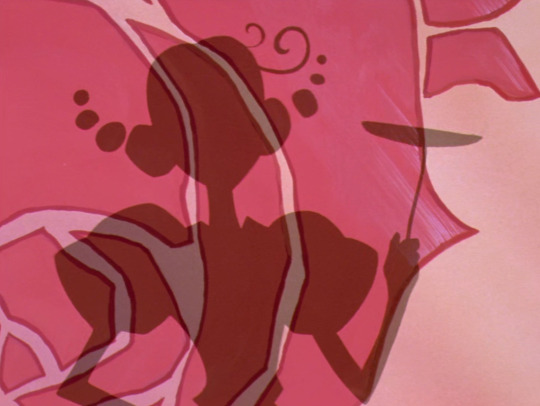
in the skit, A-Ko insists she saw a UFO, while B-Ko says it must have just been a shooting star. they argue about this for a while, until A-Ko changes the topic to disillusionment: she knows that Santa Claus, wizards, fairies, princes on white horses, and kind-hearted, true friends only exist in fantasy. but she begs to be allowed to keep her belief in UFOs.
the inclusion of UFOs in this scene may not seem particularly meaningful. the skit draws a constrast between childhood illusions and adult cynicism, notably including "true friends" on the list of fantasy creatures. with hindsight, though, this choice does seem purposeful. maybe A-Ko wants to believe in what the UFOs represent, which is more clearly spelled out as the show goes on.
in episode 12, the shadow girls list "normal things" for people to do: study normal subjects, get a normal job, fall in love normally, get married normally, have a normal family, and live a normal life. but they conclude that being normal "has nothing to do with them" and proceed to board a UFO so that they can "go back to what's normal for them."
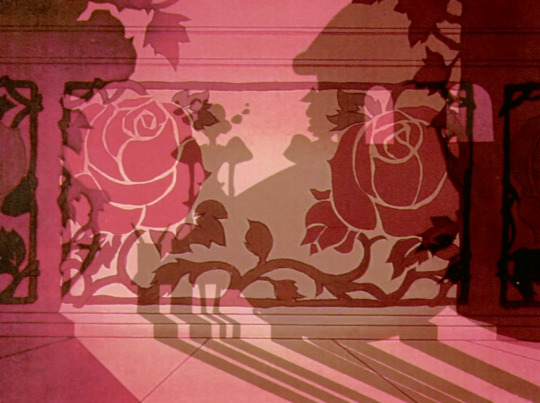
this is an obvious parallel to Utena's arc in the episode, where she rejects how society wants her to act and reclaims her own normal. but it's also telling us something about the shadow girls.
the shadow girls don't just "want to believe" in UFOs--it seems that they are aliens. they're "from Planet Kashira" according to Ikuhara; "Inhabitants of Planet Kashira" is the title of the shadow girls track on the first OST.
I think what this is telling us is that the shadow girls are outside observers. they're not natural citizens of Ohtori but exist at a remove from it. they can interact with the story, but they're a constant reminder that something beyond it exists--that the "rules of the rose crest" are not the laws of the universe.
from episode 13 on, the shadow girls put on their plays after returning to earth from their UFO. episode 24 ends with an encounter between Suzuki, Yamada, Tanaka and the UFO. we see the "monkey-catching-robot" again; once it successfully bags its prey, it enters the craft and flies away.
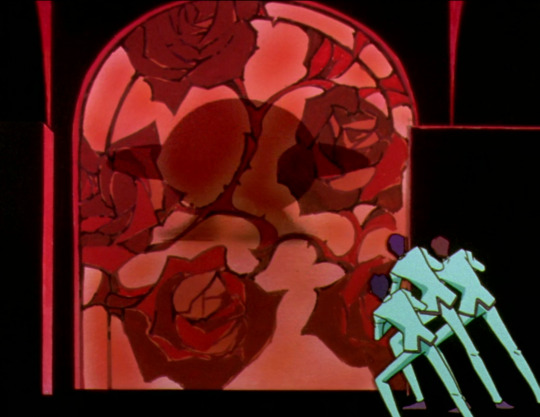
I could probably provide a reading of this scene if I tried, but mostly, I think it's there to round out the Black Rose arc. it's rather tongue-in-cheek; the UFOs are a part of the silly side of RGU. this eccentricity is humorous, but in my view also tied to the theme of individuality, which requires unapologetic strangeness. there's also something to be said for RGU's use of the inexplicable and uncanny, which often have a far deeper impact on the audience than concrete story elements.

in the final arc, the shadow girl plays begin with their UFO crashing into the chairman's tower. this is as clear a metaphor as one can hope for: the shadow girls and their alienness are a destabilizing force. maybe they're not revolutionaries--the crash appears to be accidental--but their randomness, their strangeness, their lack of propriety are a threat to the order, the masculine rule represented by Akio.
that's about it for the shadow girls. but as I mentioned, aliens are brought up in another context: the episode "Nanami's Egg."
the line "Nanami's some kind of space alien" is rather famous, and that part of the episode isn't hard to read. she's worried that she's seen as a freak, an other, by her peers. however, we also get a return of the motif at the end of the episode.
after abandoning her egg, Nanami is unable to put it out of her mind and runs out into the night to find it. she sings and dances with it, but after a bedtime conversation between Utena and Anthy, the show cuts back to Nanami, now bereft of her egg again.
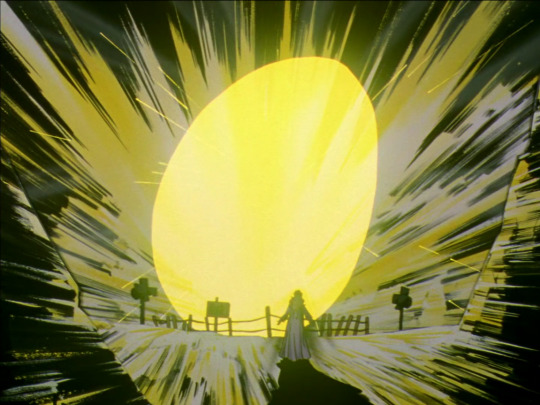
she finds it, grown 100 times larger, propped up in the woods. she promises never to abandon it again, but it seems not to forgive her, shooting strange beams at her in attack. then it fades and lays before her, cracked open.
I think this scene is adding a new dimension to the egg metaphor: in the final moments of the episode, the egg becomes a symbol of Nanami's self. she tried to be rid of it, as she killed the cat--but just as she did then, she found herself regretting it. but she's unable to forgive herself for it, feeling that she's betrayed herself and lost something very important for the sake of a false normality.
to finish this essay, I'd like to reflect on how the motif of alienness is reflected in the larger themes of RGU. in the episode 11 commentary, Ikuhara wrote the following:
I tried to live true to myself. “You’re just like an alien,” someone said to me one day. They must have been telling me, “You’re not normal.” In other words, apparently “living true to yourself” means “living as an alien.” And so I became “an alien all alone in this world.”
alienation, individuality, and deviance are all major themes in RGU. the shadow girls present a positive image of what it means to be an alien: they are carefree and unconstrained. however, for the other characters, being an alien--an individual--is not so easy. it sets them apart from the social order and may even put them in danger. therefore, RGU depicts the defiant joy of deviation, along with the pain that often accompanies it. individuality may be a threat to the system, but that's exactly why it's difficult to achieve.
finally, "alienness" serves as a great metaphor for self-other encounters, as I've touched on throughout this essay. if we are individuals, that means we are fundamentally separate from one another, because we cannot experience each other's experience. thus, we are each of us aliens to each other.
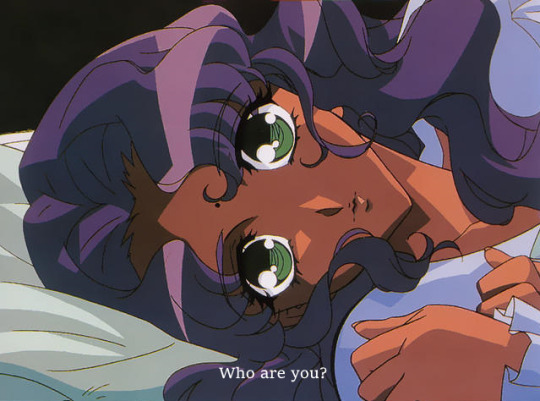
Anthy asks Utena this question as if she truly does not know, as if Utena is some mysterious being encountered in a dream. they are drawing closer together, and so the fact of their alienness is only becoming more pronounced. it will take the rest of the show to find out if contact is possible.
72 notes
·
View notes
Note
Hi Tony i want to ask something of you. In fanon more often than not i see Jake becoming slightly more unhinged and unnerving as he gets older. Do you think this would hpapen canonically? Or are all these fanartsits and writers just projecting what they want from jake on jake
This isn't a hate on it by the way, I just realised the other day I see more often the idea of Jake becoming more unnerving as he gets older alongside Dirk and that i'd accepted it and I'm unsure if its canonically viable or not.
I actually think the nature of Jake is that people project what they want on to him-- be you an author, an audience, or a character within the text. It's an interesting concept because Jake is a character who is never afforded free will and even in fanfiction and transformative works made to give Jake free will, he's still a character doing an author's bidding ultimately.
There's a bit in Meat that discusses this with Calliope and Dirk iirc. Calliope wants Jake to have free will, but Dirk argues that Jake is incapable of free will. And truly, even on a metatextual level, the existence of a narrative voice renders basically everyone, but especially Jake, incapable of free will within a narrative.
I don't know if you've seen Revolutionary Girl Utena, but there's an exchange in Utena that I believe they're referencing intertextually here between Utena and Touga about Anthy. Utena insists that Anthy does not want to be the rose bride, and Anthy confirms this. But when Touga defeats Utena and takes Anthy as the rose bride himself, Anthy claims being the rose bride is all she's ever wanted. Touga then says Anthy is incapable of free will and her expressions of "wanting to be a normal girl" when with Utena were just Utena projecting her own wants on to Anthy and claiming them to be free will.
(pinch of salt, I haven't rewatched Utena in a few years, but this is how I remember the scene)
In many ways, this is what Calliope, and us as authors, do to Jake, and what in text Dirk is criticising as a concept. He's like, well I'm projecting my desires and wants on to Jake and you say that's bad but at least I'm being honest about it. I'm treating Jake like a puppet, but that's all he's ever going to be anyway.
Er. I think I've got wildly off topic from your actual question.
I think getting older in many ways is realising that being 14 is a state of mind and that's just who you occasionally are for the rest of your life. So yeah, I think ageing does come with this element of derangement. I have a lot of thoughts about Jake as effectively this ageing child star, put on a pedestal on Earth-C at 16 and it becoming insidious, exploitative.
Jake is self aware of his lack of agency on a literal level within the narrative, perhaps even of the narrative itself-- like a gilded bird cage of his own making and he probably could slip out between the bars but then who would he be, where would he go, would everyone hate him and abandon him? He'll just stay trapped, stay pretty on display, stay hurt until everyone probably leaves anyway because an audience is a very very fickle thing.
And I think that does sort of lead to an angle for me of Sunset Boulevard, tearing the yellow wallpaper, the starlet breakdown. Which is the depressing, almost Swift approach to it. And then you have the Ultimate Jake approach to it, the Snap. And yeah, I think historically Jake takes and takes and takes and bends and bends and bends and is called selfish for that and eventually that would snap anyone. If on top of that, he's aware of Dirk's actions and of the narrative, of being on display constantly even if he escapes that little bird cage, if the only way to ensure people stop fucking looking at him is to destroy the audience itself-- yes, I would accept that story as viable for his character.
184 notes
·
View notes
Text
Let's talk about the real Chida Mamiya.
He's the entire reason the Black Rose Arc happens. This arc is revealing to the audience what silent violence is at constant work at Ohtori. All the seemingly stock Shoujo setting characters are revealed to have desires, worries, sorrows, and pain equal to the candy-colour-highlighted duelists, bar of the autonomy of dueling to state their demands. Whereas protagonists Utena gets increasingly discouraged to look deeper into any issues, is withheld information, regard duels- which she previously opposed- as routine. Her final duel with Mikage is even demanded on her own accord, she doesn't hesitate to inflict violence on him.
And yet Mamiya in his true self is barely shown, and so many memories of him entirely rewritten. He wasn't the elegant boy who resembled a mythical figure. He was a regular looking boy with freckles (bar the symbolic eyes of disillusionment).
Nemuro before meeting Tokiko and Mamiya was often feeling excluded from his peers. Even though he's still a student, classmates call him professor. To a point Nemuro believes himself to be unfeeling because everyone else says so. Until he meets Tokiko who organizes a massive project for a single boy. Mamiya's and Nemuro's talks, and contemplation about mortality actually make Nemuro realize that he can care for others. Mamiya in his wisdom, in his struggle for life, in just being can touch upon Nemuro's to touch upon more sympathetic, compassionate feelings. He knew he was about to die soon. Yet everyone around him tried everything to prevent his death. Even though Tokiko loved him, she tried to constrict his finite time to his bed. But Mamiya had accepted that he would die. More than anyone else of the entire cast, he was ready to accept his mortality.
Yet Mamiya's actual will got drastically rewritten: Anthy!Mamiya says he wanted immortality. So Neumro becomes Mikage Souji. All his previous work can continue to be used for Akio's purposes. So, Akio can continue to rope Souji for his purposes.
Even in his life, Mamiya's actual desire got ignored, talked over, and instrumentalized for the desire of others to do good. And finally evenTokiko's and Nemuro's good intentions were exploited for Akio's gains.
The original Black Rose circle actually didn't care at all about the dying boy. All the desperate efforts of Nemuro's hard work were just for their benefit. The didn't care Mamiya died.
He also became Mikage's scapegoat. All the bad things Mikage did, the mass murder out of deep despair that none cared for the one overlooked boy, the manipulation of eventual duelists, using the pain of others for his own gain, he ould blame them on doing them for Mamiya's sake. But Mamiya never asked to be saved.
The real Chida Mamiya didn't look special, but he was deeply loved. His sheer life was what made him stand out of Tokiko, and later Nemuro. The memory of him got rewritten to the point that his personality became unrecognizable. We barely see what he really looked like, and that he refused eternity, actually. In fact, only his grave contains his memory at Ohtori. Otherwise Souji is forced to graduate, Tokiko leaves Ohtori. None else will know how important and detrimental a simple boy was in the history of Ohotori. Mamiya is just like all the over disenfranchised Black Rose duelists: False perceived, misrepresented, overlooked, overheard, actually not looking distinctive.
The only who remembers him correctly, is Tokiko. She remembers her brother so dearly, she returns to the place that brought her so much grief to bring flowers to his grave. The one who could accept his passing and mortality, remembers the actual, real Mamiya. And how important he actually was.
#Revolutionary Girl Utena#Chida Mamiya#I rewatched episode 22 and 23 and oh boy do I have thoughts about this all!#absolute irony how the arc which needs to be erased form the character's memory#is full of deeply symbolic characters and yet Mamiya Tokiko and Miakge are barely talked about.#Also I need to talk about Tokiko in her own post becuase she deserves it.#Also also regarding that Mamiya is a teen (boy) who's wishes got ignored ties in with Tsuwabuki's desires getting trampled over too.
21 notes
·
View notes
Note
You haven't gotten a lot of Non Quirk questions in a while, so I wanted to send one that I think would be fun. What do you think would be the favorite anime/series of each 1-A Character? I know Tokoyami would be a Jujutsu Kaisen fan, but the rest I'm not sure.
Can I just say how much I enjoy questions like these? It's always really fun to get questions unrelated to Quirks, especially more light hearted, character focused questions like these. I appreciate you sending this in and encourage more non-Quirk related questions. That aside, I will expand this to include manga as well. There are some choices on here that I think are perfect, but I know that certain animes aren't the best adaptation.

Sato: Food Wars. Maybe Toriko if you want something more on brand with him. I would say more about it, but that would imply there is anything deeper to read into with Sato.
Koda: Pokémon. There really isn't anything complicated about this choice. Just a fun, lighthearted series with wonderous creatures under the main character's control.
Mineta: Without question, it's Kill La Kill. He's actually one of the few people who are able to read into it on a deeper level and what it's trying to say but nobody believes him.
Denki: I don't know, Seven Deadly Sins? Kaminari just seems like he would be the most basic, go with whatever's is the most popular kind of fan, never really commiting to anything for too long.
Tsuyu: I think she would be into cute and happy series. Something light and fun that puts a smile on your face and could enjoy with other people around. Think something like Spy x Family.
Sero: Maybe Steins' Gate? He's on the same level as Denki, but it's usually more along with critics are going with then general audiences and at least takes some time to think about it.
Ojiro: Pretty much any heavily technical fighting anime, like Hajime no Ippo, but has a special place in his heart for Dragon Ball Z. Who knew that a martial artist with a tail would hit a chord with Ojiro?
Hagakure: I think her being into Sailor Moon would make sense. Something fun and flashy. I could easily see her using her reflective powers to do the whole Moon Prisim Power thing.
Aoyama: I could see him being kind of anime snob, being more interested in really old animes like Revolutionary Girl Utena or Rose of Versailles. Just something really pretty looking for his Bishonen soul.
Mina: Again, another character like Denki, but instead of focusing on shonen, she's more into whatever is popular with rom coms or slice of life, like Don't Bully Me Nagatoro or Dress Up My Darling.
Jiro: I honestly see her being more pulled towards the soundtrack of an anime rather then it's content. Though I do think she'd be interested in Cowboy Bebop with it's general "cool" feeling to it.
Tokoyami: He certainly seems like the guy that would be into the whatever edgy anime flavor of the month. First Death Note, then Tokyo Ghoul, and most recently Jujutsu Kiasen.
Shoji: He'd be into the Berserk manga. Just one of that people that reads super mess up stuff and is one of the chilliest people around. The only time he gets angry is when you mention any of the adaptations.
Kirishima: His favorite would be Gurren Lagann and there is nothing you can do to change my mind. It's just too perfect. That being said, if you want to pick something more ongoing, I'd say Jojo's Bizarre Adventure for obvious reasons.
Uraraka: I think she'd be into One Piece. I'm not sure why exactly I picked that out, I just think that she would like it. Maybe it's the mix of good, light heart adventures, lots of action and heart renching movement that makes me think she'd like it.
Tenya: Pretty much anything related to Gundam. I could see him being into the mechanics of the robots and the amount of stragy involved in the fights. Out of all of them though, his favorite would be the objectively best Gundam series: G Gundam.
Bakugou: Bakugou is both sides of the deep Naruto fan coin. He's simultaneously the guy that's actually reading into it and understanding what's it's saying, but also the obnoxious dude bro that talks about it like it's the greatest manga ever without question.
Shoto: It was honestly really hard to think of anything for him. He just doesn't seem like the kind of that would be into it. I was tempted on Fire Force for a joke, but I like the choice of Fruits Basket better. I feel like the complications of family and bonds would speak to him.
Momo: I was tempted to go with Doctor Stone, but I had to go with Fullmetal Alchemist. She's definitely one of those people who slaves over all the little details and themes in whatever she is watch, her face glowing as she talks about Elric's character and journey.
Izuku: I really wanted to pick One Punch Man for obvious reasons, but I think he'd be more pulled towards Hunter x Hunter. I think he'd especially be interested in the power system that's one of the few in all of manga that doesn't have to do with whatever you're born with.
#My Hero Academia#Not Quirks#Midoriya Izuku#Deku#Katsuki Bakugou#Shoto Todoroki#Ochako Uraraka#Uraravity#Tenya Iida#Momo Yayorozu#Eijiro Kirishima#Red Riot#Mina Ashido#Pinky#Fumikage Tokoyami#Tsuyu Asui#Froppy#Denki Kaminari#Jiro Kyoka#Sero Hanata#Hagakure Toru#Ojiro Mashirao#Mezo Shoji#Aoyama Yuuga#Sato Rikido#Koji Koda
57 notes
·
View notes
Note
Are Luke and Leia actually incestuous?
Well, isn't that the question of the hour?
Per what... canon wanted you to believe, no. There was a misunderstanding in which the pair (for understandable reasons) did not realize they were blood siblings. The pair had interest in one another and were very close, Luke at first seemed to think of her romantically, and Leia at least used him to upset Han (see Hoth) but later they realize "Ah that was weird Force twin bullshit and actually a strong platonic bond" and Leia happily gets together with Han where Luke does... different things depending on which franchise we're accepting as canon today.
However, given the fact that people do ask that question, the answer's kind of yes. We start A New Hope with Luke very clearly interested in Leia, now, he never says "Damn that lady's looking fine tonight" but he does stare longingly at her hologram in wonder and is not entirely upset when she kisses him in Empire Strikes Back. Leia for her own part does seem to be more attracted to Han but does at least see Luke as enough of an option to kiss him.
They're then suddenly told they're siblings.
That probably doesn't entirely dissipate what feelings they had but it makes them not an option at all. Suddenly it is completely off the table and Luke and Leia will proudly proclaim their feelings were always platonic and oh look there's Han go date him instead.
Basically, it got too spicy for Luke and Leia (completely understandably with a thumbs up from the audience) but that doesn't mean that it... wasn't a thing...
Look, if Luke and Leia were in the show 'Revolutionary Girl Utena' they would earn a spot in the student council per their incestuous behavior but would easily be out-incested by every other member who has a sibling.
If that makes any sense to anyone.
#star wars#star wars original trilogy#luke skywalker#leia organa#luke/leia#meta#headcanon#opinion#shipping#star wars shipping
79 notes
·
View notes
Text
I really do love how Revolutionary Girl Utena takes the trope of “prince” and turns it upside down.
At first the series leads the audience to believe that Utena wants to be a prince due to her love/admiration for the prince she met as a child. This suggests that being a prince is something given to you, like the ring, that to be a prince means a higher destiny for you chosen by someone else. And, through this, the reason Akio is no longer a prince is for the opposite reason, where the higher power (Anthy) stole his princeliness from him.
But as the series progresses, we learn that’s not the case at all. Utena becomes a prince not because someone else paved that road for her or told her to (if anything the opposite, everyone tells her she can’t be a prince). She becomes a prince because she chooses a noble path, because she wants to save the girl, because she wants to protect others (Anthy, Wakaba, Shiori in the Black Rose arc, etc).
Likewise, Akio didn’t stop being a prince because Anthy took the powers of Dios from him. He stopped being a prince when he left the noble path. When he began abusing his sister. When he began manipulating the people around him for his own personal gain.
That’s why he can never regain the power of Dios; the power of Dios rejected him the moment he stopped helping others. The moment he stopped saving others.
That’s why Utena is able to harness the power of Dios; because she chose the noble and good path, because almost everything she does is for the sake of someone else as well as herself. She helps others to make herself feel better, yes, but she would never hurt or leave someone else behind for her own benefit.
It’s for this reason Akio thinks that Utena didn’t cause a revolution; the only thing he views as revolutionary is him regaining the power of Dios. The audience sees that, even if people are forgetting her, Utena caused a revolution for most of the characters (Shiori and Jury, Saionji and Touga, Miki and Kozue, Nanami and Touga all beginning to repair their relationships, Anthy gaining self autonomy) but because she wasn’t the literal cause it’s not seen as “revolutionary”.
She didn’t fix things for the other characters. She inspired them to fix things for themselves.
If that’s not revolutionary, I don’t know what is.
87 notes
·
View notes
Text
Let's just barrel through these what's the last question I discussed again-
Oh, yeah the third.
How many in are we now? Eight- There's eight now. Gunsli what exactly have you been doing? Honestly I've been working on the ocmilgram with Star and also watching Utena. Outside of that I'm going to level with you all. I'm actually bored with Kotoko's interrogation.
These questions are like the worst of trial two. It's like no one even knows who Kotoko is as a character. So, let's break down why I feel this way while emphasizing what I meant when I said if a person tells you who they are fucking believe them.
(Editted: 04/02/24 2:00pm For clarity and to add extra information that was neglected due to the draft glitching out like several times and me just wanting to be done.)

Q.04 How familiar are you with the other prisoners' changes?
Kotoko: Wouldn’t you know more about that? What I have is just from things I’ve observed and a bit of prior knowledge. I’ve been collecting information on criminals for a while after all.
I'm going to try to be brief with this question because all the ones after this go rather in depth. So, here's a list of all the times Kotoko has expressly stated that she's gathering information on the prisoners as she goes.
Kotoko's Trial One Voice Drama,
"Guard-san. No... Es. Don't you want to join forces with me? I think the two of us would make good partners."
Join forces with you?
"With you, in the role of the Prison Guard with the information that you gather from interrogations, and me, in the role of Prisoner with the information I gather from my daily life here- Working together and sharing our findings. What do you think?"
Kotoko states from the beginning that she will use her position as a prisoner to gather information on the other prisoners.
Basically, offering to be a mole for Es or go undercover. Pretending to be just another prisoner while secretly having an alliance with the guard and feeding them information on the others. Now it's up to personal opinion whether she's good at that or not. Especially since she completely throws that idea to the wayside in favor of being hired muscle as soon as her behavior is validated.
However, she does blatantly admit that she doesn't know much about the prisoners which is why she plans to observe them or has already started observing them in some cases. As she flatly states that she's already been observing someone.
If you're going there, then I'll ask. When did you sneak into the interrogation room? Even if it's true that you saved me, I don't remember promising to forgive you for that rogue-like behavior.
"Is that so? Then I'd like to ask; is Milgram purposefully designed in that way?"
Designed that way as in... Letting prisoners do what they want?
"You should be the one to know about this. The cells here don't even have locks."
I... should know?
"For example, me being suspicious of Mikoto Kayano's actions, carefully tracking him and his behavior, it's all under your permission."
Then the information she gives Es within her first voice drama to prove how useful she could be is all stuff she and the audience were capable of observing through Milgram.
21/10/26 (Kotoko’s First Trial)
Kotoko: ……come, Es. Let’s fight together.
"Heh..... It seems like, as always, you're a stubborn one."
Say that again, why don't you.
"Haruka Sakurai. There's more vigor to his actions than before. Although he comes off as weird and immature, it appears that he now has a budding interest in the conversations of those around him."
21/04/19 (Futa’s Birthday)
Haruka: U-uh, um, Futa-kun! Um! Um!!
Futa: Huh? Shut up already… Didn’t I already say not to make a big fuss about my birthday. I’m not some kid who gets excited by stuff like that anymore!
Haruka: ……?? Ah, er, i-is it your birthday……? Th-that, ah, um, h-happy birthday……
Futa: ………… You will tell nobody about this conversation.
21/06/22 (Haruka’s Birthday)
Mu: Haruka-kun, are you awake……? Happy birthday.
Haruka: M-Mu-san? I… I-I’m awake…… Th-thank you, very much. I’m… glad……
Mu: ………… Shall we talk? You know, recently I’ve been pretty interested in you.
Haruka: ……!! I-in me…? Hehe, hehehe…… interested, in me.
1/09/02 (Yuno’s Birthday)
Haruka: Y-Yuno-san. Good morning! T-today’s your birthday, right……? Ha-happy birthday……!!
Yuno: Oooh…… Thanks? You’ve definitely changed a bit huh, Haruka. You speak a little louder now, and actually look people in the eyes when you talk.
Haruka: Eh, ah, i-is that so…… I wasn’t, aware of it myself, but...... Heh, hehe. Is that so.
Yuno: Ding ding! My sensor is telling me…… this is probably a girl’s influence. Well, everyone here is slowly changing, I guess. Even me.
...
"On the outside, Yuno Kashiki doesn't seem to have changed much. However, I think her habbit of going along with others all willy-nilly is fading out. Or maybe the real Yuno Kashiki is only starting to reveal herself now."
21/07/05 (Mu’s Birthday)
Mu: Yuno. Don’t you have something to say to me?
Yuno: Huh? To you? Me? ……ahh, uh? Your birthday, right? Happy birthday~
Mu: How mean… Since it’s my birthday, I really wish you’d said something before I had to come and tell you myself.
Yuno: Right, right, I’m sorry. I’ll be more careful in future~ Later! Haha… things have become even more of a bother… ……so was that Mu-chan’s real personality, then? It’s probably because the guard did something, right?
Hey, what kind of performance is this?!
"Futa Kajiyama has definitely undergone a major change. He's now lashing out at others less and less, although he's justifying and defending himself more than ever-"
21/01/17 (Mahiru’s Birthday)
Mahiru: Fufu, it’s a special day today. I can’t help but feel something good’s going to happen.
Futa: What’s with all the muttering to yourself. It’s creepy.
Mahiru: Geez, you really don’t understand, Futa-kun. You’ll never have a proper romance with that attitude!
Futa: Who cares. Obviously this is because today’s your birthday. It’s just the day you happened to be born, it doesn’t mean anything. Here, I’ll give you my tomato, so just shut up and eat it. That’s your birthday present, so be grateful.
21/10/06 (Mikoto’s Birthday)
Mikoto: ……ah, Futa? What’s up? Did you come to celebrate my birthday?
Futa: Hah!? Like I care about your birthday. ……what’s up with you, though, you’re usually a lot more excited. I thought you were the sort of idiot who’d make a big deal over your birthday.
Mikoto: Yeah, usually that’d be the case. ……I think I must be getting tired. It’s like I’m anxious over something but I can’t really explain what it is…… Like, the feeling that I’ve been totally wrong about something. Haha, but it’s not like talking to you about it is gonna do anything.
Futa: Yeah, yeah, just like you say. Talking to me about it isn’t gonna help. ……but, it’s not like I don’t get what you’re saying. Or rather, I understand exactly what you mean. And if it’s the same thing as I’ve been feeling, then it will just get stronger as time goes on…… probably. But anyway, rather than talking to someone like me you should go and bother the others. Go and get showered with their stupid birthday wishes.
KOTOKO-
"Heheh... Have you realized... That following their interrogations, all of the prisoner's actions and intentions have gone on to change?"
Literally every detail she brings up about the prisoners in her first voice drama are things that were covered and alluded to within the portal timeline conversations that took place before her trial. One of said interactions concerning Futa directly involving a man she admits to stalking. So, she more than likely overheard that interaction.
Oh, but now from this answer we know that she had some prior knowledge, isn't that interesting?
NO! Of course, she'd have fucking prior knowledge and got damn it I'm sick of bringing this up but-
Kazui states in his first voice drama
"Murderous, huh...? Well, I won't deny that."
Mm? You’re acknowledging it, huh?
“I do. At the very least, I believe I’m a murderer. And I regret it. Not that there’s any use to that remorse.”
“Use to your remorse”…?
“Putting that aside, what even is your source of information? I don’t think there are many people other than myself who would consider me a murderer.”
What do you mean?
“For example, why would someone gather a bunch of acquitted murderers together and try to make them repent?”
It's confirmed through articles in Deep Cover that Kotoko was in fact taken to court for her actions and acquitted. This makes it more likely that even though Kazui states what he's giving is an example it's more than likely what's actually occurred and he's just being indirect to see how much Es actually knows.
Considering that there were articles on Kotoko's case there's a chances that their are articles on all of the other prisoners cases as well. Except unlike Kotoko who genuinely feels she has done nothing wrong and any decent person will agree with her and has no issues displaying that information because of it. The others have rightfully avoided disclosing hard information on the cases they've been involved with more so focusing on their subjective feelings on the situation.
Yet, we have allusions to there being consequences for their actions outside of Milgram from the beginning.
This is seen in the board from After Pain,
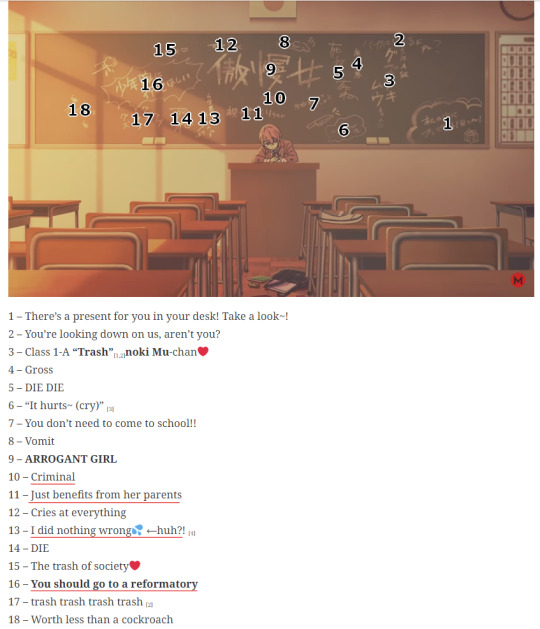
Brought up in Kazui's first voice drama and written interrogation,
"I don’t think there are many people other than myself who would consider me a murderer."
Q.08 Which do you prioritise between logic and feelings?
Kazui: I put my feelings first and it ended badly. So, I don’t want to act just based on feelings again.
Q.13 Who do you want to see right now?
Kazui: They won’t see me anymore.
This is also shown through the ending of Bring It On.
So, if one has been paying attention to all of the prisoners stories her having some prior knowledge wouldn't be surprising or new information either. Kotoko is shown getting all her information from online and even looking into articles pertaining to her own case where her name isn't mentioned. It isn't hard to believe while looking into stuff for that she came across articles on the other prisoners cases as well. Especially since she states this in regards to Futa,
Q.09 Which of the other prisoners do you think resembles you the most?
Kotoko: That’s a hard one. I’m only able to answer based on my guess on what they did. But I think the one that probably resembles me the most is Futa? Though he’s also the person who resembles me the least.
If the other prisoners cases were like hers and their names not mentioned within articles discussing them than it's no surprise she can only guess what they may have done.
Yet if she was looking into cases similar to her own and came across Futa's that would add depth to her wanting to see what his justice was and her taking a bit of an interest in him from the start.

Q.05 How do you deal with evil that can’t be bested by strength?
Kotoko: Force it so that it can. No matter how long it takes, no matter what means I’ll need to use.
If she can't use her excessive violence in broad daylight because there's a chance someone will stop her- She'll wait and watch as a crime happens just so who she wants to hurt is by themselves when she attacks and no one can interrupt.

Hell, she'll even go home and change clothes then come back instead of helping immediately.

Then she'll say she caught the person in the act of abducting a child and they got into a scuffle to cover her own ass.

From the beginning Kotoko has shown the sort of person she is. She hasn't covered it up in the slightest. Of course, if there's a situation where she can't use force, she'll simply create one. She showed the audience her doing this three times already.
We see her do this in Harrow then she does it over the course of the intermission as well.
Though most importantly in my opinion she was introduced to the audience while doing this. From the beginning Kotoko has made her dislike of Mikoto incredibly clear.
20/07/01
Mikoto: Hey, hey, Koto-chan. I’ve been thinking this ever since I first heard your name, but don’t you think the names “Mikoto” and “Kotoko” kinda sound like siblings?
Kotoko: No.
Mikoto: Don’t say that! Let’s get along well from here on as the Koto-Koto combo!
Kotoko: I’m not doing that.
20/08/03
Mikoto: By the way, Koto-chan. Who’s stronger between you and Kazu-san? You both know martial arts, right?
Kotoko: ……if it was a fair one-on-one fight, probably Kazui.
Futa: Isn’t that obvious? What a stupid question. There’s no way a girl could win in a fight against a man. This is real life, not a manga. There’s too big a difference in body size. And that’s what determines the weight of your attacks.
Kotoko: ……Futa’s not entirely wrong there. In a lot of martial arts, they specifically split up divisions based on body weight for that reason. I’m bantam, and he’d probably be either cruiser or heavy. Well, I’d still break an arm or two though.
20/10/07 (Mikoto’s Birthday)
Mikoto: ■■…… gh…… Gah…… ■■…… aaa…… nh…… ■…… ■■■■■……!
Kotoko: …………hm. Have you finally calmed down? Kayano Mikoto.
Kotoko: ………… So you want me to wish you a happy birthday? I don’t really mind, but is that really something for you to be saying to me?
Mikoto: You’re the last person I need to have the whole group. If there was just one person left it’d be bugging me all night and I’d never get to sleep, right? At times like this you have to abandon your pride and just say something, right~?
Kotoko: Ok, here you go. Happy birthday. ……if this is what will help you sleep soundly.
Mikoto: Oh, thanks! Now I don’t need to worry~
21/08/13 (Mikoto’s First Trial)
Mikoto: Ugh… ow, ow…… Ahh, first I get stepped on, then I get kicked, what even is this……
Kotoko: ……welcome back. How was it?
Mikoto: Ah, Koto-chan, I’m back. Honestly, where do I even start!? Just look at this lump on my head! It’s huge! I don’t even remember what happened, but this is violence!
Kotoko: Hm… How unfortunate.
The Second Trial Teaser Movie
"What do you think? Does it hurt? Purge complete. This is the appropriate punishment."
22/12/15 (Kotoko’s Birthday)
Mikoto: Ah, Koto-chan. It’s been a while. Both of us have kinda split off from the group, but how’ve things been? A lot’s happened, but fr now let’s try to get along. I mean, it’s your birthday today, right? I got the feeling nobody else was going to do anything, so I came to celebrate.
Kotoko: ……how carefree. It doesn’t matter, a villain like you won’t be forgiven next time either. And when that time comes, it’ll be the end for you. I’ll make sure of it myself.
Mikoto: Ahh?? Just try and do it, you nutjob. I’ll crush anyone who hurts me…… You’re gonna be totally beaten at your own game……! [TN: The word “me” here uses first person pronoun “boku”.]
Kotoko: Hm. The border between the two is getting a lot vaguer. Your entire existence is a crime. And I will see you’re punished for it. That is what Milgram, and Es, and I have chosen.
Double
Why, why, if only I were never born, if only- Why, why, I’m so sorry.
Deep Cover
"Don’t remember a thing, not a thing, poor Me poor Me."
Kotoko First Trial Written Interrogation
Q.14 Are there any prisoners you don’t get on with?
Kotoko: Mikoto. He’s loud and bothersome.
She even admits to stalking Mikoto outright in her first trial voice drama and disliking him from the beginning.
"For example me being suspicious of Mikoto Kayano's actions, carefully tracking him and his behavior. It's all under your permission."
In deciding whether to forgive or not... One has to observe the human nature...
"It's something like that."
Because she had her suspicions about him. Because he was annoying and loud. Because she doesn't think he should even exist. Which is why she says this to Es in regards to saving them in her first voice drama,
"What's this, staring at me with that expressionless face of yours?"
Last time... Thanks for watching out for me.
"Heh, I should be the one thanking you."
Because it was never about helping anyone. It was about making sure the people she doesn't believe should exist stop existing. If it was ever about protecting anyone she would have intervened as soon as she saw a crime in progress not just stand by and let it happen until the person she wanted to attack guard was down the most.
Because as she continued to say-
"Everytime death comes the soul moves forward."

"I want a reason for judgment execution, I want it."
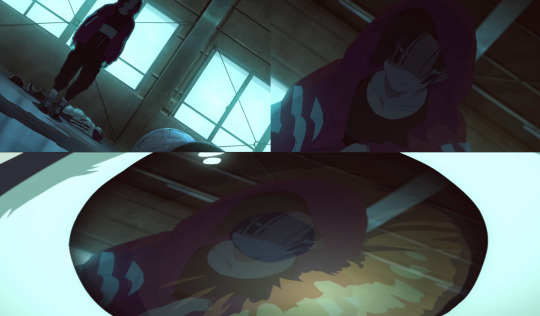
"So make yourselves my reason."
"Becoming light-headed again, it all becomes crazy. The normalcy sought for, Fading away, Everytime death comes The soul moves forward."
"I wanna perpetrate, the justice I’ve been looking for. I wanna crush, that nasty destiny. So ridiculous, so ridiculous. Come on, rely on me, go on."
In order for Kotoko to commit the justice she seeks, to enact violence she wants to while feeling vindicated in doing so a victim is needed. Whether that victim is currently being victimized or was victimized earlier doesn't matter as seen through the second man she jumped in both Harrow and Deep Cover.
In Mikoto's first voice drama Es filled the same role that the child in Deep Cover did.
All these "weaklings" were and always have been are an excuse for her to do something she already wanted to do. It doesn't matter how hurt they get in the process because the more hurt they are the more vindicated she can feel.

Q.06 Don’t you feel scared of killing people?
Kotoko: If it’s for the world. How I feel about it is completely irrelevant.
This is basically a reiteration of her first interrogation question 12 and her second trial glitched voiceline.
Trial 1 Written Interrogation
Q.12 What is your motto?
Kotoko: “There’s no other way that could let us live, so I walk this path.” [TN: Quote from Mushanokouji Saneatsu.]
MILGRAM / The Second Trial Character Voice Trailer [Full Ver.]
"From the beginning I've never asked for your understanding! My actions, one by one, are bringing Earth closer to peace. Useless Weaklings should just shut up and let me protect them!"
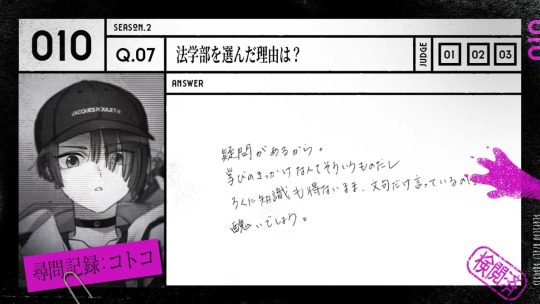
Q.07 Why did you choose law school?
Kotoko: Because I have my suspicions. That’s the majority of my reason to why I chose to study it. Cause it’s unsightly to spout complaints without having proper knowledge
This sentence while it may make sense as a translation is a bit clunky in English to me. So, I asked @doctorbunny about it and he graciously broke it down for me.
疑問があるから = gimon ga aru kara = because there are/I have doubts

学びのきっかけなんてそういうものたし = manabi no kikkake nante souiumono tashi = That's my excuse/motive for wanting to study/learn [law]
ろくに知識も得ないまま。文句だけ言っているのは 醜いではく = roku ni chisiki mo enai mama. monku dake itteiru nowa minikui dewaku(?)
The question mark there is indicative of his uncertainty on the last kana in this phrase. However, he stated the sentence can still mostly be read as-
"Not knowing enough but still complaining [about something] is unslightly."
This was how he ended up translating her answer as a whole,
Kotoko: Because I had some doubts about it. That's my excuse for wanting to study it. I think complaining about something you don't fully understand is disgraceful.
I personally find this way of translating it easier to comprehend. Plus it aligns with her annoyance during this interaction with Futa,
20/06/06
Futa: Ahh...... This is really pissing me off. I can't believe they won't let us have computers or phones in here...... Don't they understand our human rights? I'm gonna ask them for better treatment.
Kotoko: Human rights for murderers, huh...... Well, it's not like there aren't any facilities that are like that. For example, in Norway, the Halden Prison allows its prisoners access to computers. Not only do their cells not have iron bars locking them in, but apparently, they're even allowed to return to their houses and go out shopping. Even compared to this place, it's very lax. But as a result, the rate of second offences in Norway is the lowest in the world......
Futa: Ahh. Yeah, Norway! That famous thing they have there! It just shows they respect their prisoners' rights. On that point, you can really tell Japan is lagging behind the rest of the world. Because all our politicians here are just idots.
Kotoko: ......I'm the idiot for expecting to get a reasonable debate here.
Kotoko gets upset not only because Futa just agrees with her outright but because she engaged in the conversation with good faithat all. Thinking that he'd know at least a little bit on what he was complaining about. Outside of just spouting surface level nonsense. This is why she immediately blames herself and not Futa.
Along with why she says this in her first trial written interrogation-
Q.09 Which of the other prisoners do you think resembles you the most?
Kotoko: That’s a hard one. I’m only able to answer based on my guess on what they did. But I think the one that probably resembles me the most is Futa? Though he’s also the person who resembles me the least.
Along with showing a genuine interest in him within the portal timeline as we discussed before-
20/09/18 (Futa’s First Trial)
Futa: Haa…… haa…… Ok……
Kotoko: What’s up, Futa. ……your breathing seems a bit uneven.
Futa: Huh!? I’m getting ready to fight. That guard is looking down on all of us……!
Kotoko: ……hmm. Is that so…… I’m looking forward to it. To seeing what your “justice” really is.
However, we see in Deep Cover and through her first written interrogation that she was not impressed by what she found.
Bringing back the cocky hero again? How embarrassing.
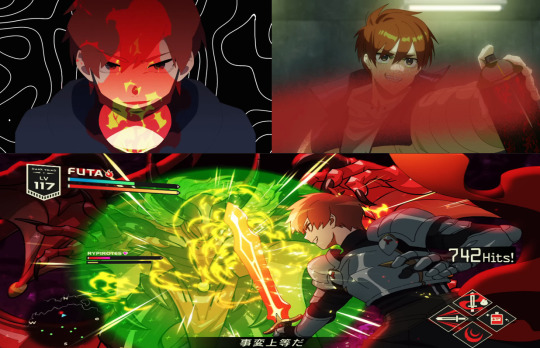
She admits that she and Futa are the most similar and dissimilar. They are dissimilar because she finds the way Futa does things childish and at times not going far enough. She find it's embarrassing trying to act like the hero who blows the horn of justice, gives out warnings, and stops when apologies are made.
"Now let’s be reasonable. We are the ones that blow the horn for justice We will punish you down, this is a warning."
It's not out of line to think that she'd find his way of implementing justice a bit naieve. Their first trial songs even contrast eachother lyrically to better highlight these differences in opinion and methods.
"All evil hypocrites should disappear I won’t stop until you say “sorry”. Now let’s begin to hunt down the liars."/ "It’s a tie after saying sorry? What are you hoping for?"
"Fuck it! You won’t be forgiven, it was stupid licking each other’s wounds Justice assemble! Till the end!"

Q.02 Have you heard of the ‘Justice Alliance’?
Kotoko: What. I don’t know what that is but it’s probably useless if they need to band together to achieve justice.
"It was stupid licking each other’s wounds." - "Oh no, surrounded, lynched by the masses!"
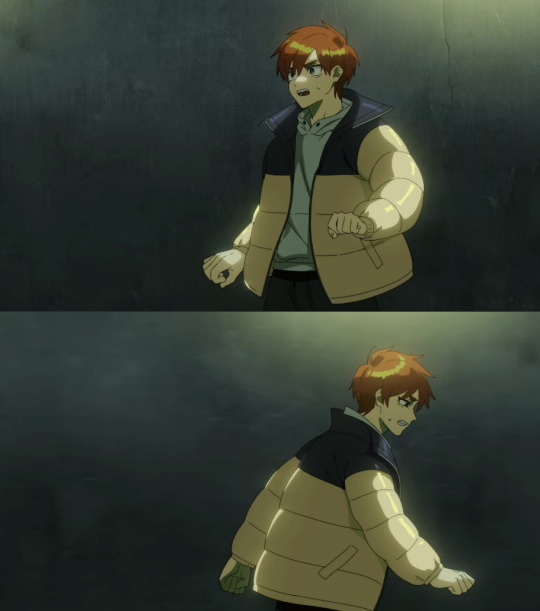
"Pressure, pressure! Applause receding far away. Me, the result of blame-shifting, no, can’t find that funny. With just one mistake and I’m out of chances Bless me, please, with one more chance. It’s not even my fault, not even slightly."
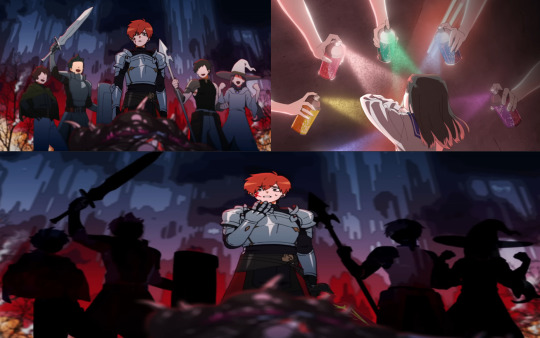
"Everyone else was having fun weren't they? What about them? Why is it just me?"/ It’s probably useless if they need to band together to achieve justice.

"Let’s keep on winning till the end- Assemble! Assemble!"
Q.06 Do you remember the name of the person you killed?
Futa: I think I remember. I saw it a lot.
Q.16 Do you have a lot of online friends?
Futa: I don’t know whether they count as friends or not. There are people that I can get excited about the same stuff together with, but I don’t know if I can really call them that.
Q.09 What do you think about the first trial’s results?
Futa: You and me are the same, aren’t we.
"Pick up your mouth-piece."

"Grind your teeth and strike a pose."
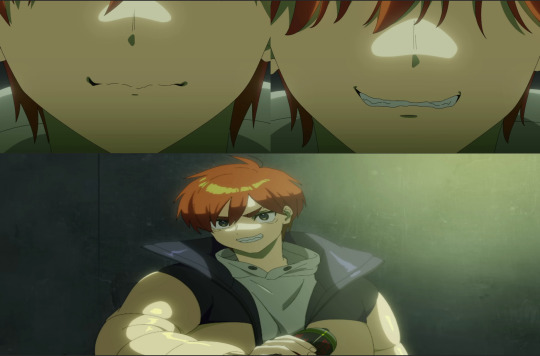
"Just like O2, burn yourselves into oblivion. Burn, burn! Open this door and check if you want to I’ll deign to hear your last words if you want, a vanishing FIRE."

Tangent aside-
Kotoko has shown that she likes to know what she's talking about before discussing it. At least that's her own understanding of herself.
This is how she misleads herself into believing she's being objective. However, like Yuno pointed out in her second voice drama Kotoko is the type to come to conclusions without discussing things with others and then act on what she's concluded.
She's the sort to form an opinion first then go to look into the subject only to find justifications for what she'd already assumed before going in. She's a cherry picker.
The Cherry Picking Fallacy is when a person or group carefully and purposefully only picks out and puts forth facts that support their point while conveniently omitting anything outside of that.
It's something that many people in fandom spaces should be used to. Since those within said spaces have been known to do that with the media they discuss. A good example of this is the post I made on nuance a while back and how it's basically used as a blanket statement term to belittle and discount genuine discussion around a media or it's characters. This extends to calling any discussion around a character that is not praising said character misogyny, misandry, sexist, homophobic, racist etc. A bunch of real things that can impact fandom in a myriad of ways but are not applied equally when discussing a media. Regardless of what media it is.
These terms are usually reserved for a select few topics of discussion within the space in order for certain diehard fans to go stop being mean to my fave. Sure, I may not do anything about these issues in real life and it may seem like I don't care how my obsession impacts real marginalized individuals but stop saying mean things about my favorite little projection box please.
That's how Cherry Pickers are they don't care about how well you state your point. Because they've already drawn a conclusion about you or the subject you're discussing and are only looking for ways to prove themselves right through whatever way possible. Even if they have to force it. Even if they have to make shit up. Even if they have to say the group or person who made the media made it wrong.
It does not matter. They do not care. They will say whatever and pick out the tiniest thing from what you said to get mad about. Because they decided before coming into this they were mad and you were wrong. So, that's how they're going to behave. They're going to be mad and state that you're wrong. The only thing you can do is decide how seriously you're going to take a person like that.
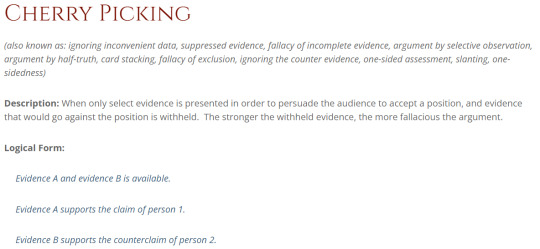
Logically Fallacious Lucid Philosophy
A cherry picker will see ten times something has failed each time someone brings up a time it has worked.
Kotoko is the same exact way when it comes to law. She's already concluded that it's flawed. She's just looking for more ways to highlight how.
This is shown off within her first voice drama.
"Yuzuriha Kotoko, twenty years old. I'm a university student, but I dropped out. Thinking of it now that the interrogation's started, I'm still not planning to tell you much about myself."
Excuse me?
"At least not before I know what your intentions are."
Hah? What in the world do you mean?
"I'll confirm this with you once more. Milgram... Everyone in this place is a murderer, right?"
Of course. Milgram says all ten of you are murderers. This is Milgram's unshakeable first requirement.
Kotoko introduces herself and bluntly states that she has dropped out of law school. Over the course of her first trial voice drama she ends up alluding to why this is.
Then bluntly states why in her first written interrogation,
Q.07 What did you study at university?
Kotoko: Technically, I’m studying law. I’m on a break right now because there’s something else, I want to do, though.
This time instead of saying she dropped out she says she's on break because there's something else that she wants to do which is taking priority. Given the change in her wording here it is possible that the verdict had an impact on how she viewed attempting to continue school. Casuing her mindset to move toward ways to correct the issues with the law within the system, instead of working entirely outside of it.
It would be a subtle change but it is one none the less.
However, this may not be due to the verdict at this point at all. She could have this view on the law simply because it's aided her in getting away with the things she's done in the past. It can be used to justify her previous actions in the situation she finds herself in now too.
Since Kotoko also brings up the law to defend her actions to Es later on in her first voice drama claiming what she did was justifiable self-defense. A lot of the prisoners in Milgram fall back on their old habbits when defending themselve from criticism in Milgram now. The series has highlighted this as well as it possibly can. Kotoko's first voice dramas being one of the best examples of this. We'll go further into Kotoko's first voice drama in the second part.
"To conclude, I've come up with a hypothesis. I think this is a place with the goal of determining the good and evil of the truth."
The good and evil of the truth?
"Is it really necessary? Ignoring the World's pre-existing methods of judging evil, going through all the effort to gather up this group of murderers, questioning whether or not they have sinned? We're told that we are prisoners, but we are not restrained and are even given the right to roam this place freely. What's the point in prying into their true nature to judge them?"
...
"Even if you think otherwise, Milgram has to be the result of someone who considers the modern judgment of good and evil unsound."
You're not wrong. Milgram doesn't rely on the law as a basis. It's the same with my judgments... All this time, I've been finding my own basis...
"Hmm~ We can really work together."
Kotoko states that she can really work together with Es once they admit to her that they aren't judging the prisoners based off the law but their own feelings. Once she is told the system she has stated having her doubts about isn't a determining factor within Milgram she's quick to relax. Even going on to state.
"This is a really unbelievable, unreal place. But personally, I don't find it that bad. It's even helped me reduce my workload."
Then elaborating further,
"Heh, I want to be like you."
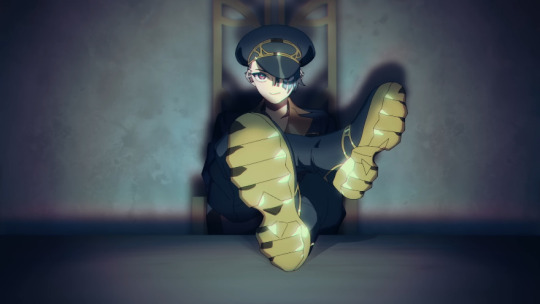
"I refuse to tolerate sin."
Just don't refuse to wait for the next part of this post. Because this one has too many images! Unlike the second part of that Amane post this is literally almost done. While with the Amane post... You know when you start something and stop midway then like forget everything due to life shit- So, it's just in limbo always at the back of your mind ringing a little bell like task not completed to the point that you don't know how you'd live without that over your head.
The second part of that Amane post is at that point. I'm so afraid of touching the part two draft of that one. That I just don't anymore but literally this other thing is mostly written. I literally just had to transfer it to a different draft from this post because this one went over the image limit. I have been writing this all day.
I am not paid for this; I am very broke... This is a labor of love. Please if you have issues with this don't take it up with me just write your own post. I've been writing this since eleven am, it is thirty minutes past midnight, and it isn't completely done. So yeah, this is what it is for now. I'm gonna keep trying my best to show my appreciation and interest in this series in my own way.
Hopefully, everyone else can do the same.
I am going to pass out now.
14 notes
·
View notes
Note
I see some people compared revolutionary girl utena and iwtv I don't get it I watch both series and don't get the comparison (I'm very slow)
ik it sounds hypocritical cuz i call myself slow but i promise u ur not! ur curiosity alone suggests u care & u have something up there. the comparison lies in how both adaptations tackle similar themes. the vampire and the prince are both parasites by definition, sold to u as the pinnacle of species but really leeches on life who so desperately want to cling onto a facismile of humanity bc theyve been locked out of it forever someway somehow. the sterile opulence of akio ohtori’s tower reminds me a bit of the dubai penthouse dont u think?
the 1973 first interview tapes with louis are all but said to be very similar in tone to a jilted ex complaining about his lover. “i was his superior in every way”. it wasnt even a tale of triumph over an abuser, it was mania, a bender, a second hand high off sampling the lives of drug addicts in a gay bar. ep3 louis all but saying he encountered an older jonah in europe who saw the devil in his eyes the way his mother did, encountering multiple vampire cults & the open question as of the writing of this post on amc claudia’s life in the 1970s. is it any wonder he saw europe as a failure & wanted to try again in america, in the epicenter of black empowernment going on in the state of california.. u can imagine how this creature pushing 100, when asked to recall his maker, can be so resentful in his recollection of him at the moment?
speaking of blurred boundaries.
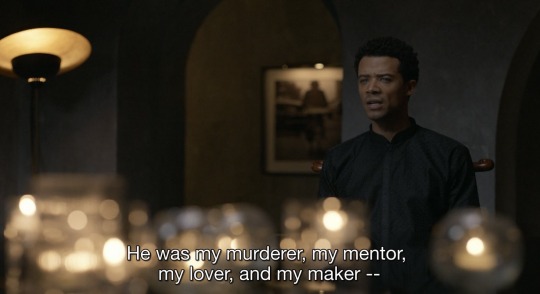
what was the full quote : the blood of the covenant is thicker than the water of the womb? yea..its all a lie. we got daughters thats makeshift brides thats also makeshift brothers and siblings who despise the broken mirror showing them the child they once was.

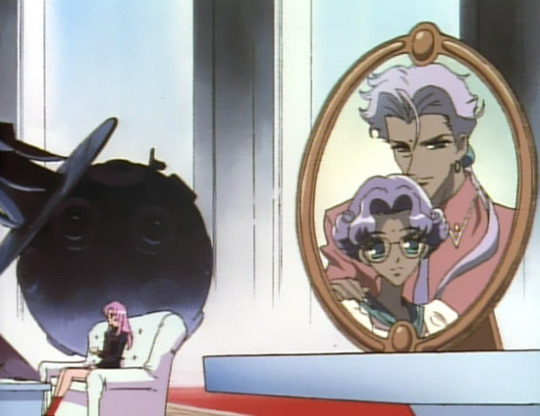
modern day louis attempts to sell this tale of triumph in the face of a fucked up gothic romance & the consequences of death made eternal to mortals. louis says this is a warning, but it serves more as his eulogy. louis wants u to believe claudia & him triumphed over lestat: first lover, his progenitor, all in one, but this story collapses when revisiting the monstrosity of recollection. at a time where death consumes the world, where death is brought from the push of a button in boardrooms thousands of miles from the scene, we are bought to the question of memory, intimacy in the eternity of death, and just what it even means to remember something. just as a vampire is born from trauma, a prince is born as the witness to eternal suffering.
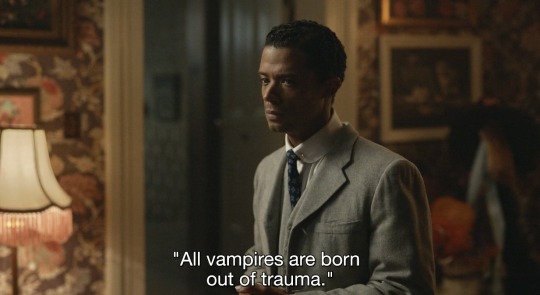
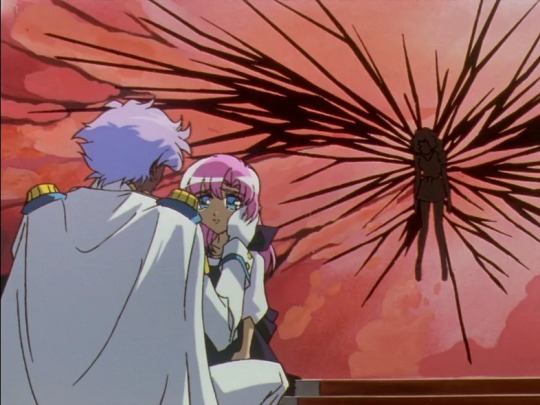
utena posits very similar questions w regard to what it even means to recall, what happens to u in the midst of memory formation. we are introduced to utena, a girl who wants to be a prince, who was saved by the prince when she was young& wants to be him, whos said to wear a boy’s uniform and the whole universe shes in sees it as such. the audience sees it for what it is, a poor man’s imitation, unusual attire, something marking her as the odd man out. we are initially introduced to some of what made utena want to be a prince thru saionji. saionji realizes in this moment, that he would have to age out of his companionship with touga to become a “Man”. eternity to saionji, represents the accursed day before he found the girl. but it is through mikage’s utter distortion of mamiya’s entire existence, through anthy, that we find out utena was the suicidal little girl seeking eternity, neither touga nor saionji brought it to her, and the eternity showed to her was the ghost of a prince showing the eternal suffering of his little sister who sacrificed everything for him. a girl who cannot be a princess is doomed to become a witch. all vampires are creatures born of trauma.
what does it mean to be eternal?
is the question both of these shows ask u. what is eternity, if not living the same miserable life over and over again? repeating the cycles of duels to get the hand of the bride, whos revealed to be a witch all along, and the endless pursuit of a prince whos never existed in the first place.
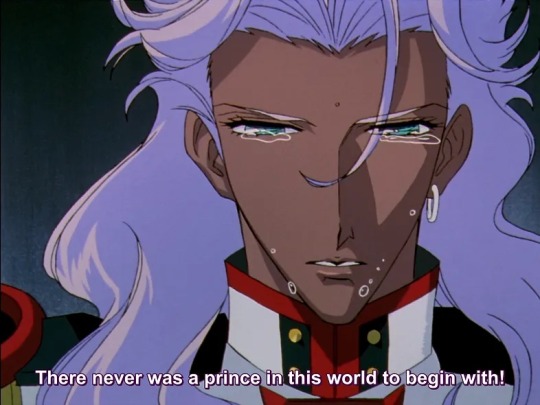
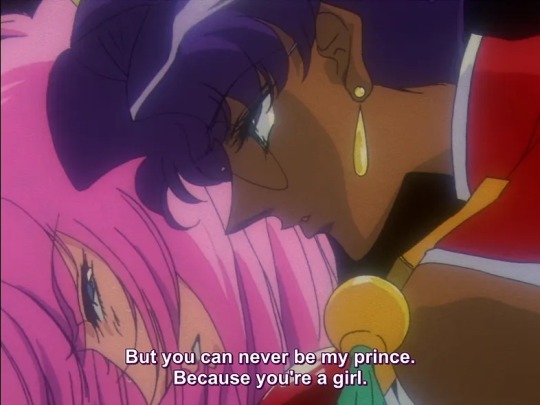
there was never an escape from the constraints of mortality, u could never escape the sorrow that surrounded u in death. u r permanently the traumatized, broken creature u were on the verge of death/suicide/some other intimate tangle with a mortal death. now what do u make of it? unlike utena tho, there is no true way at liberation. u r the beast of the outside world.
75 notes
·
View notes
Text
Rose on a Ring: Nanami’s Cowbell
[requested by @wherefore-whinnies! Thank you for the suggestion!]
The shape of Nanami’s cowbell from episode 16 is interesting—rather than a traditional rectangle, it looks more like a flower. This could be attributed to the general rose aesthetic of the show, but what’s the most recurring use of the rose in Utena? Probably the designs on the duelists’ rings and the dueling flowers themselves.
Now, let’s look at a summary of “The Cowbell of Happiness”: Nanami recieves, from an anonymous figure, a special item that she believes will give her what she wants most (status, fame, popularity). In reality, it’s not what she thinks it is and it’s actually causing the opposite effect (people think she’s crazy). However, the longer she wears it, the more complacent she grows, failing to recognize that she's becoming the very opposite of what she wants to be (an animal rather than a goddess to be admired). And, as her dream sequence with Touga heavily implies, the cows she finds herself associating with are going to be slaughtered for the benefit of humans. In the end, she’s only able to reverse this transformation when Utena cuts the “flower” from her body, freeing her.
This sequence of events can be compared to any of the Black Rose duels in the surrounding episodes, with the bell representing the rings used to control the victims’ minds, and the cow representing the evil duelist that Mikage creates. When Utena cuts the black roses from their chest, she frees them in much the same way she does Nanami. The cowbell episode can even be likened to the student council members’ arcs as well, with the bell again representing the rose signet and the cow representing the naïve child that Akio needs to manipulate in order to open the Rose Gate.
Also, what’s the purpose of a cowbell in the first place? So the owner can find their cows and bring them back when needed. Similar, then, is the promise Utena’s ring carries: “We will meet again.” The ring around Utena’s finger, like the ring around Nanami’s neck, binds her to her fate as an animal for the slaughter.
So what’s the point of Nanami having this nonsensical, half-imaginary version of the other duelists’ stories? Well, Nanami as a character represents a “child”—one that makes up wild stories with little regard for logic, but also has a fresh view that may reveal things that others ignore. It’s very unclear why anything is happening in “The Cowbell of Happiness” (Ohtori magic? Anthy magic? General Nanami weirdness?), but it’s surprisingly clear what’s happening. After all, I was able to write a pretty concrete summary that few people would dispute. “The Cowbell of Happiness” lays out all the steps of a duelists’ journey—a desire, a false solution, a period of grooming and complacency, and eventual freedom when the false solution is removed. But it shows it in such a strange way that neither Nanami nor the audience understands its significance.
#revolutionary girl utena#rgu#rgu analysis#rgu spoilers#nanami kiryuu#I'm bad at writing but Utena is fun haha thanks for reading
51 notes
·
View notes
Text
I've Been Mulling Over Utena (SPOILERS)
Alright, if you're watching Utena now or are planning to do so, skip this post cuz I'mma spoil, like the whole thing.
WARNING FOR MENTIONS OF SA, CSA, INCEST, AND EMOTIONAL ABUSE
A few weeks ago I finished Utena. I discovered it through one of Noralities videos, I think, and some time later ordered the Blu-Rays when they were on sale.

I really wasn't sure what I expected in all honesty. I had little to no preconception of it. I think by the time I got the Blu-Rays I'd completely forgotten everything Noralities or from whoever I discovered it had said; I even forgot about an old meme on my phone that puts Utena avis at the tail end of Communist.


I've been mulling over just what I experienced, and I think I have something of an interpretation of one element of the series, although I imagine the Ikuhara scholars have long beaten me to this conclusion.
I watched Noralities's video (don't bother informing me on drama or controversies, I'm too old to care about shit like that. I only care if they're bigots and have committed material harm, and I don't mean just property. If they're not like Vaush or any given alt-right YouTuber, I don't care) on Nanami since I really wasn't sure how to feel about her, and it definitely opened my eyes to things.
In my eyes, this series is very much about intimacy, particularly the ways our comprehension and expression of it can be warped to exploit us. Before Akio's sins are shown to the audience, we see Nanami's fixation on Touga, and one's response might be to either fetishize it or mock her and her behavior, but she's literally 13.
In a sense, a sibling is the "safest choice" of a "prince." Unlike the others bond in life, you don't have to forge it: the set-dressing is already there for you. There's a pre-established connection, especially if you're like Kazuo and Miki. It's an almost primeval love, a love one can stay in if they so choose, but like the chick they will only suffocate and die within its shell like the ageless members of Ohtori. This is at least from the point of someone like Nanami, and I say that as someone who was once similar to her.

I'm not going to get into details, but my abuser and I once played with such ideas. I 12, they 14. They shipped Ken and Minako from Persona 3, which should tell you everything. I was the "Ken" in her mind, and she did indeed infantalize me. Maybe I'm being too dramatic, but this was my experience. I was "into it," but shortly after we broke off, I came to realize how strange it was, and the whole sordid ordeal cast a shadow over me until I was 16. We started off as simply playing as siblings, me wanting a "Big Sister's Affection," and they a Little Brother to dote on, but things developed. I was pressured into dating, mostly through guilt-tripping, putting me in the position of a caretaker, as one who must clean the mess she makes, at one point her threatening suicide if I left, her cutting me off from my friends like all abusers do.


This was very much the theme in my experience.
The fixation Nanami has on Touga is the most explored and thus illuminates the disconcerting synchronicity the characters experience in their betrayals and troubles.
Kozue and Miki are a more disturbing mess of tangled intimacy and affection, and this could be attributed to the lesser age gap. Nanami can be curtly dismissed as a childish attachment, but the closer maturity between the Kaoru heightens how frightening such attachments can be, especially for twins. Their bond is embryonic, beyond primeval.

And by consequence of being like Nanami, this also means I was much like Tsuwabuki, a child who through unhealthy images disseminated in society comes to believe and perform ideals antithetical to his development, maturity, and health. Nanami, like my abuser, as Noralities points out, repeats the cycle she herself is blind to, and because her main example has been glamorous images of knightly princes at night and day atop pale horses eternally in love, specifically Touga, she unwittingly and subconsciously mimics him in her treatment of the younger compatriot who himself has been taught to tangle emotional and physical intimacy and perhaps even to suffer mistreatment.
Later on, Touga essentially assaults Nanami, and here Kunihiko and the crew clarify that what Nanami desires isn't sex or even romantic love. At first I was confused on what she wanted, but then an idea came: Nanami herself is confused because she's been confined to Touga and the imagery of men like him carved in stone and painted in art.
This has been me blowing out my ass despite how fancily I can write. I hope I was able to provide a long-time fan with some insight. I guess I've come to Nanami's defense, eh? I guess I was embarrassed of her because she reminded me so much of myself. Maybe that's her point.
Maybe I've been analyzing fantasms, I dunno, y'all tell me.
42 notes
·
View notes
Text


episode 12 / episode 34
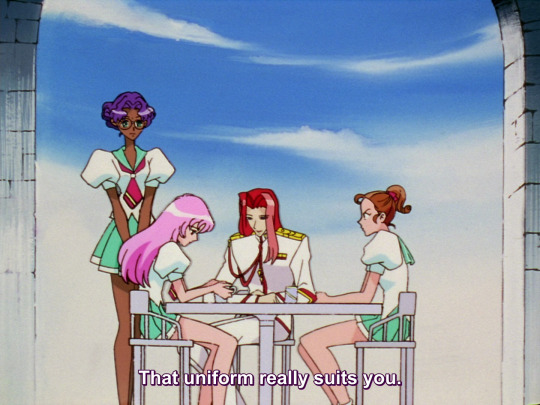
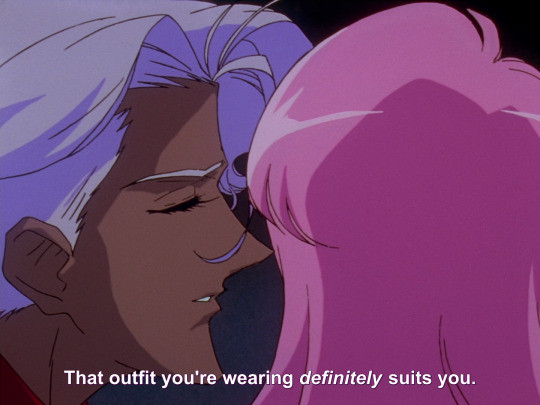
episode 12 / episode 37
there were several similarities i noted between the two episodes (12 and 34):
within the specific scenes: both touga and akio reached out and touched utena's left hand with their left hands, but touga covered her hand with his, while akio took her hand into his. in episode 12, utena and touga were accompanied by anthy and wakaba (during the day, out in the open cafeteria), while in episode 34, utena and akio were alone in akio's room (during the night); anthy was aware of it, but she was in her and utena's room and couldn't do much about the matter. anthy also couldn't do much for utena in episode 12 due to the rules of the rose seal (she was engaged to touga). also, the two scenes in episodes 12 and 34 took place after very tragic incidents happened to utena: losing the duel to touga, and consequently, losing anthy as her rose bride versus akio raping her (unarguably even more tragic).
correlation with utena's sense of self: in episode 12, utena tried (and succeeded) to take back who she was via a rematch (losing to touga made her doubt who she was as a person). who utena was as a person at this point may be referring to the role of a prince that she was able to truly embody due to her engagement to the rose bride (e.g., utena saving anthy in episode 3 from anthy's dress incident and then dancing together, utena saving anthy who was trapped in a coffin in episode 9). or, more like how the engagement with the rose bride allowed utena to be more/most like herself, one of which would be largely comprised of the princely ideals she adopted/learned and idealised (as told in her monologue of meeting the prince; utena also said she wanted to be a noble prince who saves princesses in episode 1) (i'm not sure for this part).
in episode 34, we learned the real reason utena had the rose crest ring, the real reason utena wanted to become a prince: to save a little girl suffering a fate worse than death. ultimately, in both situations (episodes 12 and 34), anthy influenced utena's sense of self, to an extent. regarding the prince, taking into account the context of episode 11, i'm quite sure utena still believed that touga was her prince in episode 12. meanwhile, episode 34 gave us (more) indisputable confirmation that akio was the prince that utena met in her past (this fact was heavily hinted at since episode 25). however, i don't think utena made the connection yet at that point. nevertheless, as a whole, in both situations, touga and akio were framed as utena's prince (to utena [episode 12] versus to the audience [episode 34]).
a common conflict/theme underlying both scenes was the pressure of conforming to ideal gender identities and presentations. this was evident in the scene with touga (complimenting utena's girl uniform and asking her out). however, it's infinitely more severe with akio because he was actively grooming utena to that end; some events of this episode were just parts of the long process (in the specific scene: asking if they're friends, mentioning that she didn't take off her ring "that night," trying to kiss her). in addition, the visuals of both touga and akio somewhat covering utena's rose crest ring with their hand gestures could be seen as analogous to them trying to suppress/diminish her princely ideals/role (touga said that losing the duel gave utena a chance at being a normal girl; he then actively tried persuading utena to this end, i.e., the compliment on the uniform and the ask for a date. moreover, touga critised utena for not knowing about the true power of the rose bride when she "fancied herself as anthy's prince." also, to reiterate: akio brought up the fact that utena didn't take off her ring when he raped her while stroking the ring; he expected that that event would be sufficient for utena to take it off [give up the role of the prince]).
i think episode 12 is an interesting foreshadowing/parallelism of some kind for later events in the final arc, with regard to utena/touga/anthy and utena/akio/anthy dynamics.
#very literal observations of the two scenes and episodes#touga mirrored akio very often#revolutionary girl utena#shojo kakumei utena#shoujo kakumei utena#rgu#sku#utena tenjou#anthy himemiya#touga kiryuu#akio ohtori#wakaba shinohara#analysis#i'm very sorry if it's difficult to follow english isn't my first language#this is the first time i wrote something like this#please correct me if i'm wrong at any parts#this write up is inspired by countless amazing rgu posts i have read#✮
130 notes
·
View notes
Text
Mikage: Boy of the Black Rose
I've long struggled to write about Mikage, who I find to be an intriguing yet elusive character. or rather, his character is understandable--his motives and feelings are communicated clearly enough--but his narrative is one of the most inexplicable in RGU. thinking it over tonight, I put my finger on one aspect of the Black Rose arc which I previously didn't know how to approach: specifically, Mikage's relationship with the Boys of the Black Rose.
the boys act as a kind of collective character, a mass of faceless people who whisper in dark corners. since RGU is about social reality, it often uses extras to deliver exposition or set the mood. the Shadow Girls are meta characters, existing somewhat outside the narrative, but regular schoolgirls at Ohtori can serve a similar purpose. they might demonstrate that Touga and Saionji are considered the hottest boys in school, or gossip about Ruka and Shiori's recent breakup.
the Boys of the Black Rose are slightly different, maybe a little closer to the Shadow Girls. rather than acting as bit characters in the larger world of Ohtori campus, I believe their existence is contigent on Mikage. while this could be put in various ways, in the most straightforward terms, the writers created them to help reflect on Mikage's character.
only one Black Rose Boy is given a face: the first one Mikage (Nemuro) talks to. when Mikage asks not to be called "professor," since they are the same age, the boy replies:
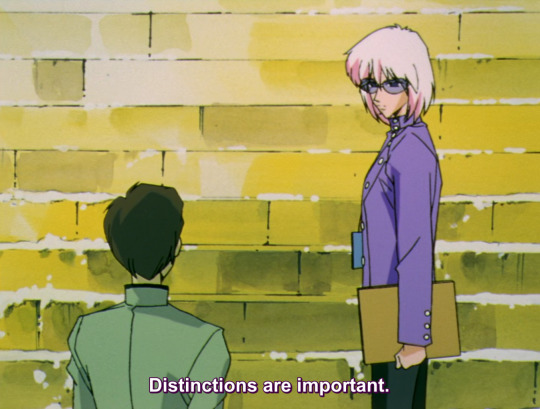
obviously, RGU relies on making its main characters visually distinct from "normal people." Wakaba calls them "special" and resents them. Utena is popular for her specialness, well-liked; in contrast, Mikage is an outcast for his. for a person to be special or a genius, there must be others for them to stand in opposition to. Mikage is set apart from his peers by his pink hair, by his unique uniform, and by being a professor.
after Mikage is introduced to his new work, the boys begin to gossip about him, saying he knows nothing about what's really going on at Ohtori. towards the end of this conversation, there's a shot of Mikage, and then he actually replies from the future to the gossip they were spreading about him.
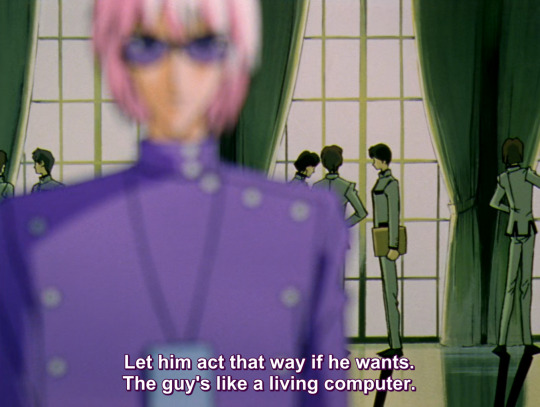
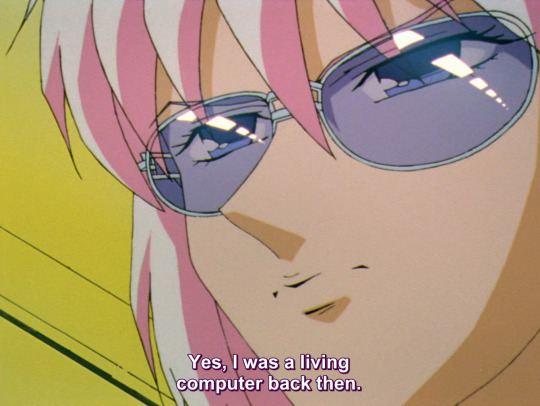
this is Mikage's eternal reality: his recollection of the past. even during the "present" of Utena's narrative, he is still walking through Nemuro Memorial Hall, which is why it's still standing, unburned. the Boys of the Black Rose that the audience sees are filtered through Mikage's memory; whether or not the boys really said these things about him is ambiguous. it's possible, but the important fact is that Mikage believes they did.
this transpersonal mirroring keeps Mikage trapped, unchanging. he feels himself defined as unable to connect with others, so he keeps away from them. this becomes a self-perpetuating cycle, leaving Mikage a total outcast.
even outcasts, however, are members of society. the Boys of the Black Rose actually have more in common with Mikage than the average Ohtori student. they're all scientists working on the same project. they have much of his coldness, sense of superiority, and intellectualism. the main difference is that they're the in-group.
while Mikage believes himself to be emotionless, it's made clear that his social isolation hurts him. he doesn't want to be set apart, but he doesn't know how to break through the barrier between him and others. it's very easy to do a queer reading of the character, given the way this is conveyed to the audience.
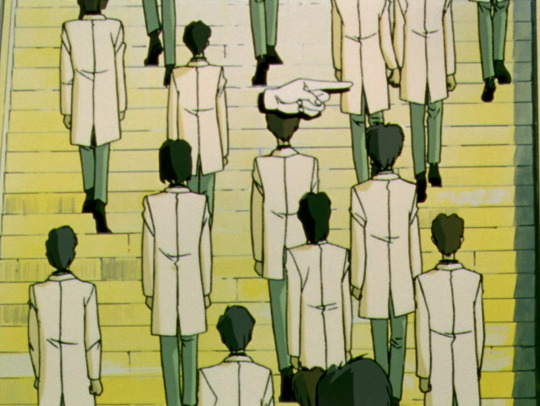
Mikage's fixation on Tokiko and Mamiya is easier to undestand with all this in mind. the world he was living in, occupied by the Boys of the Black Rose, was a cold and alienated one. in contrast, Tokiko has genuine passion, caring for her brother deeply. Tokiko's tears move Mikage, allowing his own buried emotions to break through the surface. but she also reinforces his social isolation; he is equally as hurt by her as he is drawn to her.
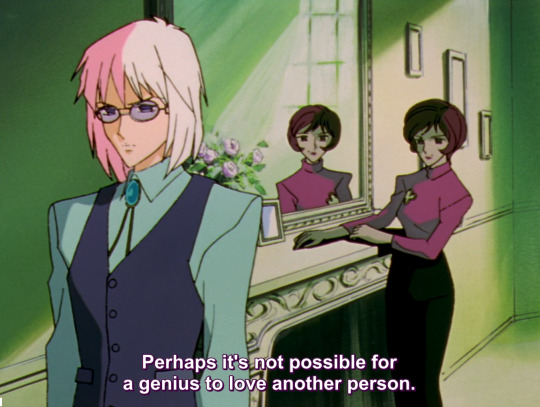
this is part of why Mikage is so determined to "defeat" Tokiko; she offered him hope of connection, but he was never able to "win" her, as men so often try to do with women.
Mamiya is something else altogether; a boy, like Mikage and the Black Rose Boys, but altogether different. warm, friendly to Mikage, not intimidated by his intelligence or reputation, and insightful. in a show full of characters obsessed with holding on (to the past, to a person, to their self-image), Mamiya is the only one who can see the wisdom in letting go.
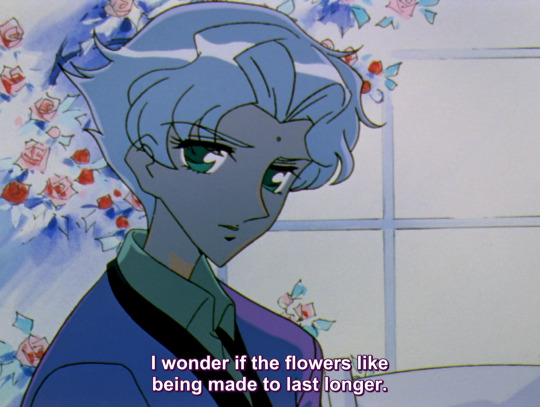
Mikage at first is open to Mamiya's words, preparing to call off their quest for eternal life. but like every character who threatens the system in RGU, he is faced with Akio. in a prototype of the later "End of the World" sequences, Mikage comes across the kissing Tokiko and Akio. this proves to be too much for him; there are some things he can't afford to lose.
the scene has significance to Mikage far beyond disappointment in love. he wanted to create a family with Tokiko and Mamiya; marriage to Tokiko would tie them together "forever." if he could be by Tokiko's side as they lost Mamiya, then at least he wouldn't be alone after his death. but if he's only Tokiko's coworker, when their work is done, he's back to being a computer.
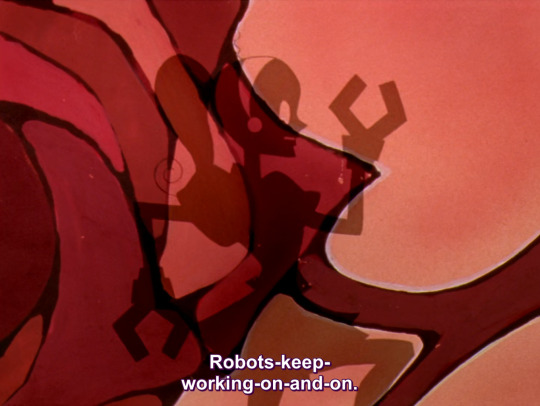
in desperation, Mikage plays into Akio's hands. under contract, he sacrifices the Boys of the Black Rose and burns down the hall that bears his name. when justifying himself to Tokiko, he claims that this act will allow them to attain eternity. in the events of the series, he's still at it: installing Mamiya as the Rose Bride will, after all, make him eternal, even though it's the very kind of eternity Mamiya wanted nothing to do with.
Mikage retreats into delusions on feeling the sting of Tokiko's rejection. though he is the one who betrayed her, he turns it around and feels betrayed himself. going even further, he casts Mamiya as the one who set the fire.
the Boys of the Black Rose are also used to emphasize his inability to face his own actions. throughout the arc, the boys are seen pushing coffins around. however, in episode 23, Mikage takes their place right before he is forced to face the truth about himself.
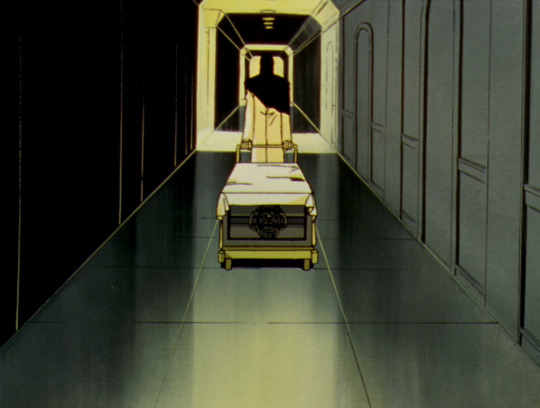
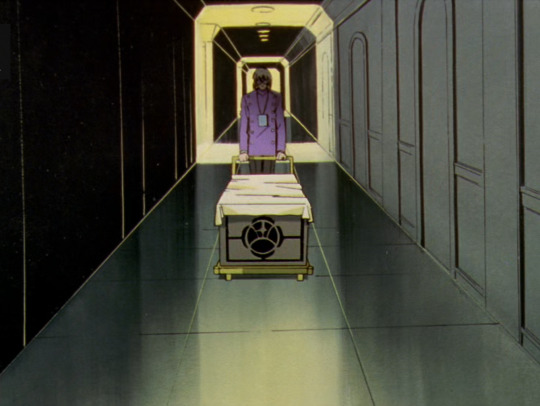
at the end of the arc, Miki claims that no one was hurt in the the fire, contradicting the previous story of Nemuro Memorial Hall. this possibly indicates that the murders are a figment of Mikage's imagination--the older Tokiko doesn't seem to react to him as if he's a murderer. more than anything, he seems guilty of self-denial and retreat from reality. Tokiko went on to accept Mamiya's death and even mourned for Mikage, while he ignored her in favor of his memories. the fact that he does not recognize her feelings is another aspect of his tragedy.
Mikage, through his fruitless revolution, loses the very things he always wanted. he attempts to throw away his past self, the cocoon of Nemuro hatching into the butterfly that is Mikage. with it, he burns away the boys who rejected him, who embodied the cold world he used to live in. he uses their sacrifice to enshrine Mamiya, idealizing him as the perfect companion. but as Ikuhara said, he was doomed to fail from the start:
Those who reject that place are, conversely, rejected by it as well. This is the nature of systems: the moment you reject them, you are forced to realize that they’re the very ground you’re standing on. Mikage noticed the trick behind the system, and he hurriedly attempted revisions. But the adult who’d created the system just said “Let’s not,” and unilaterally brought the curtain down.
the "trick within the system," is, I think, the fact that it's socially constructed. Mikage believed that on realizing this, he could simply remake the world as he wanted. he was allowed to do so for a time, when it was useful. when he ceased to be useful, he was dispatched with, because while he had operated within the system, he was not in control of it. and beneath his delusions, there was still a reality.
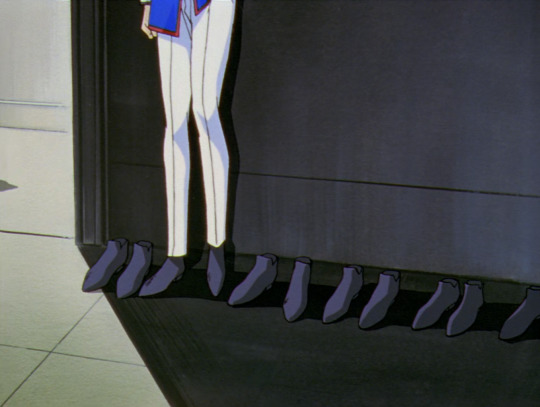
Mikage is the true Boy of the Black Rose: the true ghost, the true sacrifice, living in the desiccated world of a preserved flower. throughout the arc, he takes possession of Ohtori students who suffer from the same afflictions as him, and every time Utena defeats one of his duelists, another part of him is exorcised--another Black Rose Boy burned away. in the end, the only thing left of him is the ruin of Nemuro Memorial Hall, shown briefly in the final episode. he graduates at Ohtori, but only after losing absolutely everything. that seems to be the only way to step into adulthood: naked and shivering, like the day we are born.
149 notes
·
View notes
Text
RGU (revolutionary girl Utena) spoilers incoming

(yes I'm spoiler warning a show that's like 25 years old. What of it)
So i know that it's hardly fair to compare an artist's crowning achievement, widely regarded as one of the best anime ever written, with a cash grab made by art-destroying, soul-crushing Mouse Company.
But I'm going to do it anyway.
Let's talk about twist villains and betrayal in Revolutionary Girl Utena and Disney's Frozen!
Much has been said about Mouse Company's Frozen (2013). Someday i will talk about my deep and abiding hatred for the film from a story standpoint, but today is not the day i get into all of that. Somehow the whole thing basically was controversial when it came out?? But my least favorite thing, and a lot of other people's least favorite thing, was their super shoddy twist villain.
Now it's been a while since I've seen the movie but as far as i can remember, before the literal moment of betrayal, the audience is given basically no clues that Hans might not be a good dude. People have said, like, "oh well he's wearing gloves and in Disney movies that means someone has something to hide" and girl i gotta say, i think you're reaching. Besides - what's he hiding??
People have said this better than me, but the right way to implement a twist villain is in a way where, when the twist happens, it makes a horrible kind of sense to the viewer. If someone can see it coming before it happens, that's actually a good thing - that means that there are enough clues that observant audiences are keyed into who your characters are and where things are going. That means you're doing good writing. If people can't tell where you're going and you slap them in the face with the cold rotten fish of a bad twist villain, they'll feel betrayed alright, but not the betrayal you want them to be feeling.
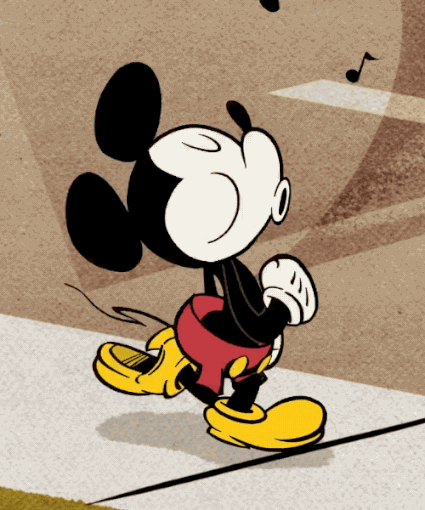
Again, hardly a fair comparison I'm making here, but let's do it anyway. Let's talk about Anthy in RGU.
Anthy is a mystery. She's a maze of conflicting desires and loyalties. Right at the end of the show, when things start to come into focus and what you've been observing for the last like 36 episodes starts to make sense, you begin to realize that she's been doing what Akio wanted her to do, the entire time. You hope and believe that, when it comes down to it, in a test of loyalties, Anthy would choose Utena.
But she doesn't.
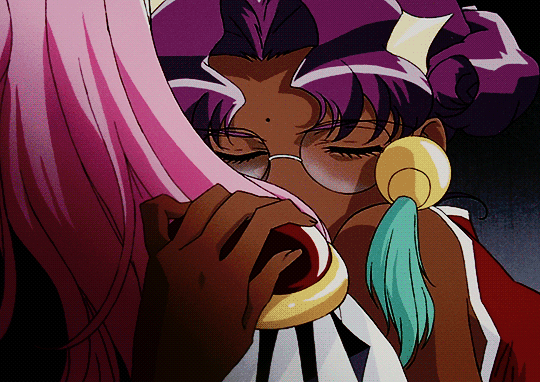
Anthy's choice shocks the audience, but it's accompanied by the horrible realization that we should have seen it coming. It's one of the most revealing character moments in the entire series. We realize that we, and Utena, have miscalculated; and Anthy's other choices come into better focus for us.
We wouldn't expect Anthy to betray Utena. And yet when she does, it makes perfect sense.
That's how you stab your audience in the gut 👍
#rgu#rgu spoilers#i don't know how to end this#Revolutionary Girl Utena#Revolutionary Girl Utena spoilers#rgu anthy#i refuse to tag anything mouse company related#I've only seen rgu once. do not come for me
11 notes
·
View notes
Text
I guess my personal interest in the Black Rose arc lies in the utter deconstruction of social roles, and meditation on power dynamics. But most of all how this arc demonstrates the ambivalence in simultaneously of everything.
Again, the arc is about the overlooked characters who're treated as if they were disposable or stock characters. The spotlight is directed away from our usual main characters. Even though the triangular constellation or even characters of Tokiko, Mikage, and Mamiya et rarely discussed, their relationships are a sign of what's to come: An adult who's unable to let go of what they adore and deciding they know better than their little sibling, a lonely teenager who's moved by younger sibling of the adult, and the sibling themselves who, unlike their older sibling can deal with mortality but gets ignored. This arc is also about the plurality of characters. If this arc is about demonstrating how perceived stock personalities are as deep as the candy-colour-highlighted people lavished in attention, by the story, by the audience, it's also an arc how people can be multifacetted, contain apparently opposed natures in them.
It's also a deeply existential arc. Whereas the real Mamiya was ready to accept that he was terminally ill, Tokiko wasn't. So she started an entire project to find a cure (with or without Mamiya's agreement). And even though Nemuro finally felt human connection through and thanks to Mamiya, he was swayed by Tokiko's ambition rather than letting Mamiya go. (I mean Utena's and Mikage's talk in the rose garden use the same construction as the cross at the burial of Utena's parents.)
In that way, Mikage is as well Utena's dark mirror image, a warning whom she might become if she can't deal with the death of her ideals and false memories. Mikage is simultaneously eerily similar in his fate of Akio's. To say, Akio also clings to his one and only childish role in which he had a sole purpose. The masses became faceless and impersonal to him as they served only the purpose to be his purpose. Without them, he would have none to save, none to praise him. With a falsified memory in which Anthy!Mamiya claims he desires eternity, Souji doesn't deal with Mamiya's death either. Instead he continue to serve a nefarious purpose, not caring about anyone but himself, and his own desire. (Also, Mikage's ending her contract is the precursor to Anthy's farewell to Akio.) At a certain point, the sacrifices, be it students seeking counseling, be it 100 classmates, are all acceptable collateral damage to Mikage, as long as they further his desire. But then again, like Utena, Nemuro was alienated by his peers, very lonely until he met Tokiko and Mamiya. Mamiya's certain death moved him so much, he made connections with both Mamiya and Tokiko. All his research was maybe done against Mamiya's will but carried out of the desire to help him, lead on by Tokiko's love and good intentions.
Tokiko simultaneously occupies the role of both Akio and Utena. She can't let go of Mamiya in spite of Mamiya voicing how futile Tokiko's endeavour is, how he doesn't actually believe in eternity. Like Akio, Tokiko moves everything in spite of her brothers wishes to even work against his wishes. She clings onto Mamiya, and burdens the reasons of her actions on him. Like Utena, Tokiko's method of denying mortality, entrapping her beloved in stasis is done with gentle violence. Utena wants Anthy to be a normal girl, meaning, she wants Anthy to have a carefree life. She means well. Tokiko wants Mamiya to rest, instead of spending his time in the rose garden. Her method of eternally keeping roses alive is by letting them dry or making sugar roses. It's a futile yet stubborn fight against decay but one with kind intention.
And in this method I see an interesting contrast. Whereas Tokiko's method of preservation is one with gentle methods, creating a Black rose can be done in two way: Either roses et artificially dyed, loosing their original colour. Which we see happening when the BR-duelists get "cultivated" with their respective prince's colour. Or the rose gets burned so hot, it's actually more charcoal in the shape of a rose than a rose. Well, if that doesn't resemble the big fire and death of 100 students....
But in that way, what I think what fundamentally makes Tokiko and yes even Nemuro different from Akio is that they both acted out of love. They made the same mistake ignoring Mamiya's desire, unable to cope with loss and grief. But unlike Akio they wanted to keep Mamiya in their lives more than anything else.
With Mamiya's death, the best of Nemuro died. Horrified how her brother's name was misused for mass murder, seeing what inability to handle loss did with Nemuro, Tokiko did face her pain. She lived on, she left Ohtori. She might still be sad, visiting Ohtori on occasions to contemplate her grief. Unlike Akio though, Tokiko finds the stasis unbearable to witness. In fact Tokiko is the only person Akio is incapable to act as cool or charming because she has advanced from his central conflict which shapes his character. His eternal youth is more unsettling than it ever was attractive. It takes Akio a massive reframing and rewriting of Nemuro's memories to the point Nemuro becomes Mikage, to alter Mikage's personality to suit his goal. And still, in the twisted, coldest, unempathetic version of himself, Mikage still thinks he found a way to be happy with Mamiya for the future...
#Lewis rambling#Revolutionary Girl Utena#Black Rose arc#long post#honestly I love Tokiko and I think she's criminally underrated
12 notes
·
View notes